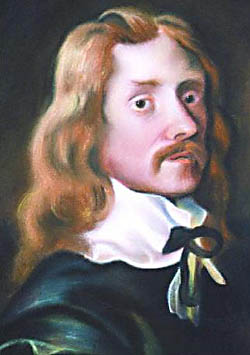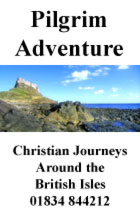Gwyn returned to Wales and became a teacher, continuing his studies on his own. He married Catherine; they had six children, three of whom survived him. His adherence to the old faith was noted by the Bishop of Chester, who brought pressure on him to conform to the Anglican faith. It is recorded in an early account of his life that after some troubles, he yielded to their desires, although greatly against his stomach . . . and Jo, by the Providence of God, he was no sooner come out of the church but a fearful company of crows and kites so persecuted him to his home that they put him in great fear of his life, the conceit whereof made him also sick in body as he was already in soul diseased; in which sickness he resolved himself (if God would spare him life) to become a Catholic.
Imprisonment and execution
Gwyn often had to change his home and his school to avoid fines and imprisonment. Finally in 1579 he was arrested by the Vicar of Wrexham, a former Catholic who had conformed to the new faith. He escaped and remained a fugitive for a year and a half, was recaptured, and spent the next four years in one prison after another until his execution.
In May 1581 Gwyn was taken to church in Wrexham, carried around the font on the shoulders of six men and laid in heavy shackles in front of the pulpit. However, he "so stirred his legs that with the noise of his irons the preacher's voice could not be heard." He was placed in the stocks for this incident, and was taunted by a local priest who claimed that the keys of the church were given no less to him than to St. Peter. "There is this difference," Gwyn replied, "namely, that whereas Peter received the keys to the Kingdom of Heaven, the keys you received were obviously those of the beer cellar."
Gwyn was fined �280 for refusing to attend Anglican church services, and another �140 for "brawling" when they took him there. When asked what payment he could make toward these huge sums, he answered, "Six-pence." Gwyn and two other Catholic prisoners, John Hughes and Robert Morris, were ordered into court in the spring of 1582 where, instead of being tried for an offence, they were given a sermon by a protestant minister. However, they started to heckle (one in Welsh, one in Latin and one in English) to the extent that the exercise had to be abandoned.
Gwyn was tortured often in prison, largely with the use of manacles. However, his adherence to the Catholic faith never wavered.
Richard Gwyn, John Hughes and Robert Morris were indicted for high treason in 1583 and were brought to trial before a panel headed by the Chief Justice of Chester, Sir George Bromley. Witnesses gave evidence that they retained their alleigance to the Catholic Church, including that Gwyn composed "certain rhymes of his own making against married priests and ministers" and "That he had heard him complain of this world; and secondly, that it would not last long, thirdly, that he hoped to see a better world [this was often construed as plotting a revolution]; and, fourthly, that he confessed the Pope's supremacy." The three were also accused of trying to make converts.
Despite their defences and objections to the dubious practices of the court Gwyn and Hughes were found guilty. At the sentencing Hughes was reprieved and Gwyn condemned to death by hanging, drawing and quartering. This sentence was carried out in the Beast Market in Wrexham on 15 October 1584.
Just before Gwyn was hanged he turned to the crowd and said, "I have been a jesting fellow, and if I have offended any that way, or by my songs, I beseech them for God's sake to forgive me." His friend the hangman pulled on his leg irons hoping to put him out of his pain. When he appeared dead they cut him down, but he revived and remained conscious through the disembowelling, until his head was severed. His last words, in Welsh, were "Iesu, trugarha wrthyf" (Jesus, have mercy on me).
Legacy, relics and feast day
Relics of St Richard Gwyn are to be found in the Cathedral Church of Our Lady of Sorrows, Wrexham, seat of the Bishop of Wrexham.
In addition, St Richard Gwyn RC High School, Flint is was named after St Richard Gwyn upon its foundation as Blessed Richard Gwyn RC High School in 1954. There is also a school of the same name in Barry, Wales.
His feast day is celebrated on 17 October.
The incident of the birds
The incident of the birds is one of the strange events in Richard Gwyn's life. Once when he was brought before a court, the clerk who read the indictment suddenly lost his vision and had to be replaced before the proceedings could resume. The judge cautioned those present not to report the incident, so that Catholics could not claim that it was a miracle. On another occasion, the judge, who later sentenced Richard to death, became inexplicably speechless in court. |





